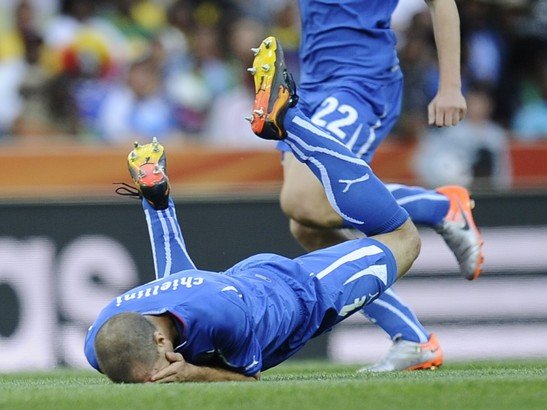OK, my patience with anti-Italian sentiment and bias by ESPN's English commentators, Alexi Lalas, and EPL advocates has come to a definite limit. Working at the Highbury has exposed me to a wealth of English football, and I have learned a bit about different players, teams and style of play. I especially enjoyed getting acquainted with the English approach to football which, compared to the Italian approach, is more forward, and attacking, as opposed cautious and counterattacking.
I have been supportive and open-minded about the philosophies espoused by the dominant European leagues, but this innocence and naiveté has not been reciprocated. Some EPLers argue that Italy's Serie A is too conservative -- to each his own. Fans have innate and learned subjectivities, but from commentators I expect just a bit more.
I opened the Highbury last Sunday morning at 6 a.m, excited for Italy's Group F match. I may be biased (highly doubtful), as I was hopeful that the Azzurri would deftly take control of the group with a dismantling of New Zealand. It was not to be: Paraguay defeated a sleepy Slovakia, 2-0; Italy inexplicably tied with New Zealand, 1-1.
My real frustration rests on the English commentators working for ESPN. I half expected them to throw down their respective microphones, sprint from the press box to the field, purchase vuvuzelas and/or pom-poms and hard tackle the Italian strikers. As the English commentators kept pointing out, the Kiwi victory over Italy was one of the great moments in soccer history.
It is tough to lose a game, 1-1. One almost feels the game ended in a draw. The game was clearly dominated by the Italy, which out-shot New Zealand 23-3. New Zealand had one shot on goal. Italy had possession for 72 percent of the time and had 15 corner kicks to zero. All credit to the New Zealand side, but Italy cannot finish their strikes. Listening to ESPN laud-time and time again -- the courageous Kiwis was a bit like listening to tennis commentators cheer for double faults. Sure, someone wins a point, but there is a decorum to the exercise.
Many soccer purists/historians cite Florence, Italy circa 1640 as the place and time where the infamous "dive" was invented. Paolo "the clumsy" of Genova inadvertently tripped in the penalty area and was given a penalty kick. So he kept tripping. At least this is the fairytale imposed on the Italian game by some pundits. In the 29th minute of Sunday's game, midfielder Daniele DeRossi was fouled inside the adversary's box as his shirt was tugged and he was forced to the ground. Invariably, the discussion evolves into how Italians dive-and how they use the tricks of the game-to win a game. I am sorry, but I have seen nearly every game of this World Cup and hundreds of league matches the last year or so. "Diving" is endemic but not particular to any one league. The English, Irish, French, Spanish, Italian, etc., all have strikers with two left feet who somehow fall when crossing the mystical, magical line separating the general playing area with the penalty area. I cannot explain the phenomenon but it is not owned by one nationality or league. It owned by Cristiano Ronaldo of Portugal-in his team's first match-up against the Ivory Coast he had such a blatant, poorly executed dive that somewhere halfway around the world Lindsey Lohan began to shutter uncontrollably.
In his post-match commentary, Alexi Lalas described the action as such, "Daniele DeRossi goes down in the box...a little tug here, all it takes is a little tug, go down, you're Italian, it's the law." Ian Darke of ESPN actually called DeRossi's play "deeply pathetic." Given that criteria, I expect Ian Darke to physically assault Kaká next time he dives. Tired and irritated by barrage Italian clichés, I compared the commentary from other media outlets to see exactly what was reported during the match. Italian commentary for the foul against DeRossi's translated as: "Let's see it again to make sure. Yes, a definite penalty shot. There are no doubts. Smith looks at the ball while holding DeRossi's shirt, and the referee sees correctly."
Italian journalists are the most cynical, negative individuals in Europe. When the Italian team returned from a group stage loss to North Korea in 1966, the team was pelted by rotten tomatoes upon landing at the airport; after DeRossi received a well-earned red card against the Americans in 2006, Italian newspapers spent weeks analyzing his childhood and interviewing his elementary school teachers asking if he was always prone to violent outbursts. I do not think people understand-the Italians are not a self-promoting team and we are not a self-promoting people. We are quite critical of our football teams and ourselves. As one commentator said a few weeks ago "the English always think they are going to win the World Cup and they almost never do; Italians always think they are going to lose in the first round and always win." Especially with football, Italy is not pleasant when discussing the shortcomings of the national team.
In this global, oft-televised tournament, let us hope the commentary and observations of individuals given the power of the media to express their views with some neutrality use that forum to expose the world to the beauty and power of the game. It is a sad day when the microphone becomes merely another tool to stereotype.
She received a BA from Beloit College, where she developed as a modern dance choreographer. She has worked in the arts administration world in Chicago and has interned at The Repertory Theater in Milwaukee.
The performing arts -- film, theater and music -- are her passion, and she believes that the stage is not limited to scripted, but rather expands even the length of the soccer field.
She works part-time at the Highbury Pub in Bay View, which inspires her to share her cross-cultural experiences and her ideas on "the beautiful game."







